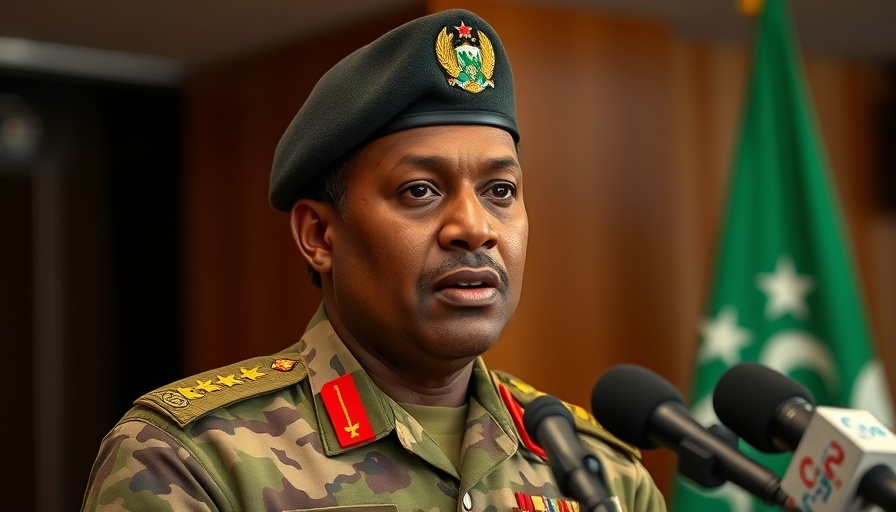
The Fragile Diplomacy of Sudan's Leadership
Amidst a complicated backdrop of civil conflict and political maneuvering, General Abdel Fattah al-Burhan stands at a crossroads. Recent diplomatic engagement with U.S. envoy Massad Boulos has sparked hopes for renewed U.S.-Sudan relations. However, Burhan's alliances with Islamist groups like the Al-Baraa Ibn Malik brigade could threaten these efforts. The U.S. has taken a firm stance, imposing sanctions on this brigade, reflecting its growing wariness of Burhan's commitment to democratic reforms and human rights.
Understanding the Implications of Islamist Alliances
Burhan's reliance on Islamist militias complicates any move towards democratization. These groups are pivotal in the ongoing conflict with the Rapid Support Forces (RSF), creating an uneasy reliance that raises questions about Burhan's intentions. As Sudan navigates the rocky terrain of governance, corruption remains a major obstacle. The U.S. views genuine cooperation as contingent upon a reduction in military ties to Islamist factions, demanding a shift towards democratic governance.
A Broader Context: Sudan's Position in Regional Politics
Sudan's current political landscape is reflective of larger regional dynamics where Islamist extremism poses challenges not only to governance but also to economic stability. The ramifications of U.S. sanctions can impact Sudan's access to foreign investments, vital for the reconstruction of infrastructure and economic recovery. As Burhan strives to hold power while appeasing both local factions and international players, the balance of power teeters perilously. The potential for civil unrest looms large, signifying a need for a peaceful resolution and effective governance.
Future Predictions: Navigating Towards Stabilization
Looking ahead, the relationship between the U.S. and Sudan will likely hinge on Burhan's ability to distance himself from extremist factions. A commitment to dialogue and reform could yield significant benefits for Sudan, improving its position within the African Union and potentially other trade partnerships under frameworks like the African Continental Free Trade Area (AfCFTA). Furthermore, fostering trust may encourage diaspora engagement and foreign investments crucial for rebuilding and modernization efforts.
The Importance of U.S. Involvement in Sudan's Future
The implications of U.S. involvement are profound. A supportive U.S. partnership could facilitate sustainable development and economic growth, helping to alleviate poverty and empower youth through education and innovation. By taking a stand against corruption, prioritizing human rights, and emphasizing governance, the U.S. can help shape a more stable and prosperous future for Sudan. In this context, the international community has a significant role to play as an advocate for democracy, providing a much-needed counterbalance to internal divisions.
Conclusion: The Path Forward
As international observers watch closely, the actions of Burhan in the coming months will be critical. Engaging with the U.S. offers a potential pathway toward a brighter future for Sudan, but this hinges on his willingness to make difficult choices. For many Sudanese, hope remains intertwined with the prospect of a government that prioritizes peace, human rights, and sustainable development over failed alliances.
For those interested in the ongoing narrative of Sudan’s political landscape, staying informed and engaged is crucial. Awareness of these dynamics not only sheds light on Sudan but also encourages informed discussions about broader continental issues such as governance, democracy, human rights, and the role of international partners in African autonomy.
 Add Row
Add Row  Add
Add 




Write A Comment